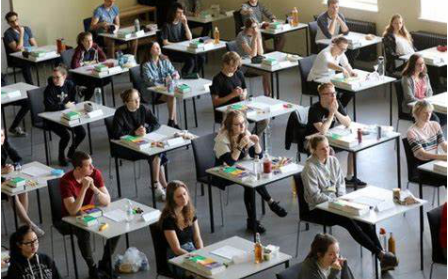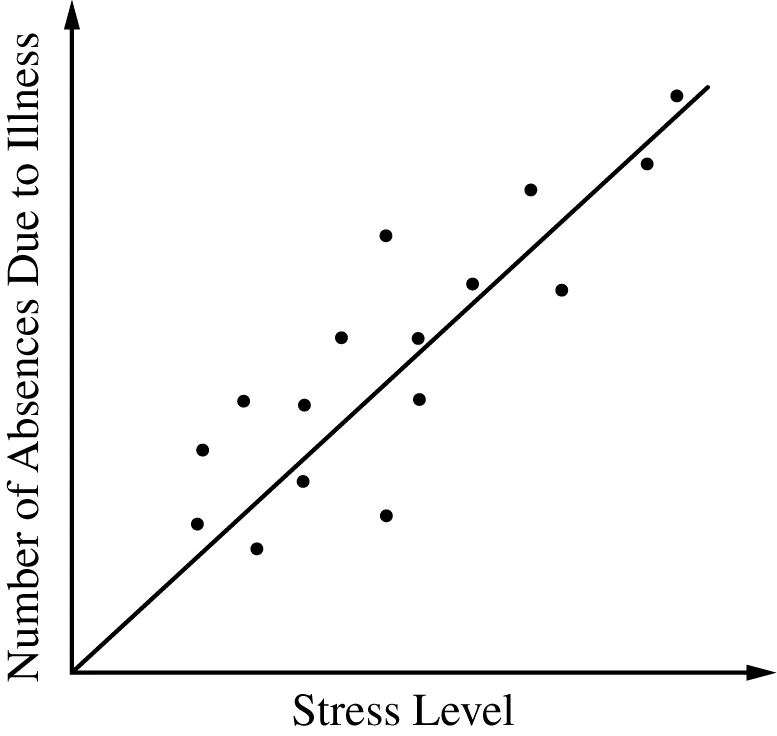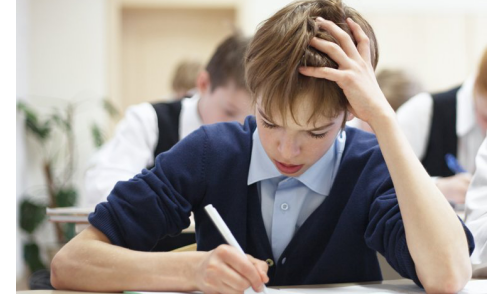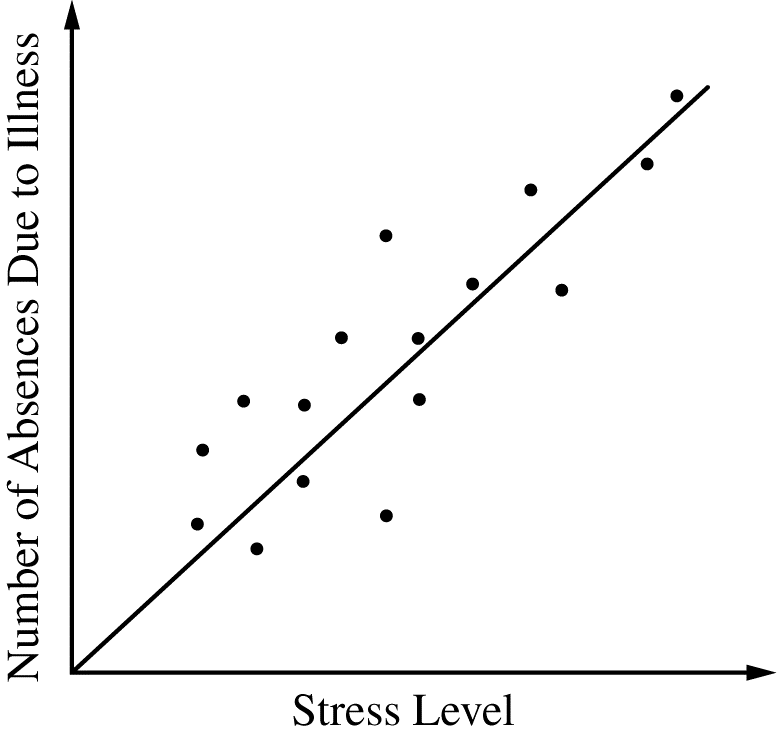
距离今年AP大考只有100天左右的复习时间啦,这个时候同学们除了梳理知识点,也可以去找真题来练了。本文就为大家分享2道AP心理真题(FR)及参考答案。同学们可以自己先做一遍这2道题,然后对着标答来修改答案结构与思路。

1. Jackie has been chosen for the lead role in the school play. She is both nervous and excited about this opportunity.
Part A
Explain how each of the following concepts may help her performance in the play.
l Context-dependent memory
l Acetylcholine
l Kinesthetic sense
l Selective attention
Part B
Explain how each of the following concepts may hinder her performance in the play.
l Proactive interference
l Yerkes-Dodson law of arousal
l External locus of control
2. A survey was conducted to determine the state of the physical and psychological health of high school students.
Part A
Some of the survey questions related to student stress levels and student absences due to illness. The data on these variables are displayed below.

What is the most appropriate conclusion that can be drawn based on the figure above?
Explain how the data depicted in the graph are consistent with the exhaustion stage of the general adaptation syndrome.
A researcher wants to conduct another study using the same variables, but wants to set it up as an experiment. Explain one reason that an institutional review board (IRB) might not approve this new study.
Part B
Some of the survey questions related to risky behaviors. The results indicated that 90 percent of high school students’ risky behaviors were influenced by social factors.
Explain how each of the following may contribute to an increase in risky behaviors.
l Deindividuation
l Normative social influence
Part C
Explain how each of the following may contribute to good physical or psychological health of high school students.
Cognitive restructuring
Incentive motivation

1. Jackie has been chosen for the lead role in the school play. She is both nervous and excited about this opportunity.
Part A
Explain how each of the following concepts may help her performance in the play.
l Context-dependent memory
l Acetylcholine
l Kinesthetic sense
l Selective attention
Part B
Explain how each of the following concepts may hinder her performance in the play.
l Proactive interference
l Yerkes-Dodson law of arousal
l External locus of control
Rubric for FRQ 1:
1. Context-dependent memory
Context-dependent memory means putting yourself back in the context where you experienced something can prime your memory retrieval. Jackie knows that she should rehearse her role on the stage on which the play will actually take place to do her best in the performance. Any dialogue or other elements of the play that are external to Jackie (e.g., another actor) can help her better recall the memory.
2. Acetylcholine
Acetylcholine has a role in memory, learning, muscle movement, emotion, arousal, or calming to a positive practice-/performance-related outcome. Jackie’s acetylcholine allows her to remember when she needs to say particular lines during the play. Also, Acetylcholine allows Jackie to move easily from one position to another on the stage.
3. Kinesthetic sense
Kinesthetic sense or kinesthesia is the system for sensing the position and movement of individual body parts. Jackie can dance and wave her arms in the air during the play without having to look for them due to her sense of kinesthesis.
4. Selective attention
Selective attention is the focusing of conscious awareness on a particular stimulus. Jackie ignores her upset stomach as the play starts so that she can focus on her lines.
5. Proactive interference
Proactive interference is the disruptive effect of prior learning on the recall of new information. Jackie forgets her line for the play when she accidentally speaks a line from a play she was in last year.
6. Yerkes-Dodson law of arousal
Yerkes-Dodson law of arousal is the principle that performance increases with arousal only up to a point, beyond which performance. This law suggests that moderate arousal would lead to optimal performance.
7. External locus of control
External locus of control is the perception that chance or outside forces beyond our personal control determine our fate. Jackie thinks her performance depends on how the rest of the cast does, so she does not rehearse enough. Also, Jackie believes she is destined to fail, so she doesn’t perform as well.
2. A survey was conducted to determine the state of the physical and psychological health of high school students.
Part A
Some of the survey questions related to student stress levels and student absences due to illness. The data on these variables are displayed below.

What is the most appropriate conclusion that can be drawn based on the figure above?
Explain how the data depicted in the graph are consistent with the exhaustion stage of the general adaptation syndrome.
A researcher wants to conduct another study using the same variables, but wants to set it up as an experiment. Explain one reason that an institutional review board (IRB) might not approve this new study.
Part B
Some of the survey questions related to risky behaviors. The results indicated that 90 percent of high school students’ risky behaviors were influenced by social factors.
Explain how each of the following may contribute to an increase in risky behaviors.
l Deindividuation
l Normative social influence
Part C
Explain how each of the following may contribute to good physical or psychological health of high school students.
Cognitive restructuring
Incentive motivation
Rubric for FRQ 2:
1. We can positively predict number of student absences due to illness from students’ stress levels. There is a positive correlation between stress level and number of absences. As stress levels increase, the number of absences tends to increase.
2. The research findings are consistent with the exhaustion stage of general adaptation syndrome (GAS), in which our body’s immune system is depleted and we get sick.
3. It is unethical to randomly assign people to stress levels because it might cause undue harm to participants. It is harmful to induce stress in the participants.
4. Deindividualization
Deindividuation is the loss of self-awareness and self-restraint occurring in group situations that foster arousal and anonymity. A person feels anonymous in large groups, so they do irresponsible things. Drew is at a concert with 100,000 other people, so he loses his sense of self-awareness and tosses his empty soda can on the field instead of throwing it in the recycle bin like he normally would do.
5. Normative social influence
Normative social influence is the influence resulting from a person’s desire to gain approval or avoid disapproval. People might do risky things because they think it will make them look cool in the eyes of others. Susie has never stolen anything, but when she is shopping with friends, she sees them shoplifting, so she steals to fit in with her classmates.
6. Cognitive restructuring
Cognitive restructuring means that reinterpreting one’s negative thoughts in a positive way leads to better physical or psychological health. When Rik gets a bad grade on his physics test, he is sad. But he tells himself that at least now he has lots of room to improve before the next test and starts to feel better about himself. Liz is overwhelmed by her pile of homework, but when she decides that it is a challenge that she can conquer, her headache goes away. Elliot changes his negative thoughts to more positive thoughts, which leads to better psychological health.
7. Incentive motivation
Incentive motivation means an external stimulus that pulls someone towards a behavior that contributes to good physical or psychological health. When Barney saw an ad for a free t-shirt for joining the gym, he signed up for a membership. Kristin meditates for 15 minutes a day so that she will receive extra credit in her health class.
2018年AP心理真题(FR)解析就到这里,大家完成得怎么样呀?文末我们再提醒一下今年参考的AP党们,2019年5月底,CB对AP几乎所有科目进行了一次大纲更新。不过,在刚刚过去的2020年考试中,由于疫情原因,考试没有按原计划进行。
所以2021年的AP考试,即将是新考纲实施后的第一次完整AP考试。如果你还不知道如何根据新考纲针对性复习,点击预约试听【唯寻AP复习冲刺班】,唯寻教学天团授课,根据学员进度定制课程,对历年真题进行深入分析和针对性训练,启发国际课程思维,结合历年考题缩小复习范围,复习时间再紧张,也能书写一份疫情下底气满满的标化成绩。

更多AP复习攻略点击

学习有方法,成长看得见
筑梦牛剑/G5/常春藤
